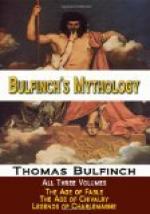“Return again,” said Sir Launcelot, “for your quest is done; for I have met with Sir Tristram. Lo, here he is in his own person.” Then was Sir Gawain glad, and said to Sir Tristram, “Ye are welcome.” With this came King Arthur, and when he wist there was Sir Tristram, he ran unto him, and took him by the hand, and said, “Sir Tristram, ye are as welcome as any knight that ever came to this court.” Then Sir Tristram told the king how he came thither for to have had to do with Sir Palamedes, and how he had rescued him from Sir Breuse sans Pitie and the nine knights. Then King Arthur took Sir Tristram by the hand, and went to the Table Round, and Queen Guenever came, and many ladies with her, and all the ladies said with one voice, “Welcome, Sir Tristram.” “Welcome,” said the knights. “Welcome,” said Arthur, “for one of the best of knights, and the gentlest of the world, and the man of most worship; for of all manner of hunting thou bearest the prize, and of all measures of blowing thou art the beginning, and of all the terms of hunting and hawking ye are the inventor, and of all instruments of music ye are the best skilled; therefore, gentle knight,” said Arthur, “ye are welcome to this court.” And then King Arthur made Sir Tristram knight of the Table Round with great nobley and feasting as can be thought.
SIR TRISTRAM AS A SPORTSMAN
Tristram is often alluded to by the Romancers as the great authority and model in all matters relating to the chase. In the “Faery Queene,” Tristram, in answer to the inquiries of Sir Calidore, informs him of his name and parentage, and concludes:
“All which my days I
have not lewdly spent,
Nor spilt the blossom of my
tender years
In idlesse; but, as was convenient,
Have trained been with many
noble feres
In gentle thewes, and such
like seemly leers;
’Mongst which my most
delight hath always been
To hunt the salvage chace,
amongst my peers,
Of all that rangeth in the
forest green,
Of which none is to me unknown
that yet was seen.
“Ne is there hawk which
mantleth on her perch,
Whether high towering or accosting
low,
But I the measure of her flight
do search,
And all her prey, and all
her diet know.
Such be our joys, which in
these forests grow.”
[Footnote: Feres, companions; thewes, labors; leers, learning.]




